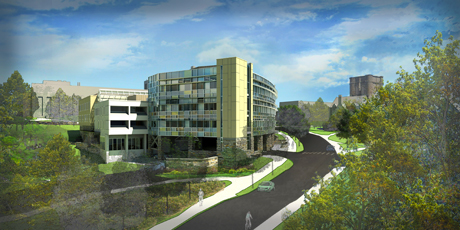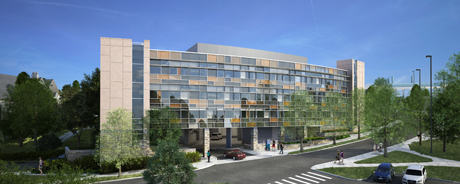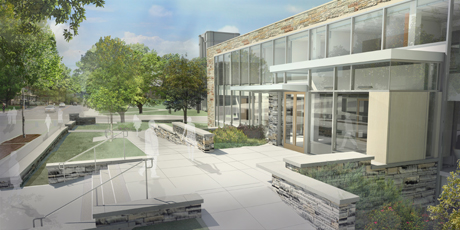New health center design takes shape; fundraising proceeds
By Daniel Aloi



The design has been unveiled for a new university health center planned to open at Cornell in 2017 as a comprehensive update and expansion of the current Gannett Health Services facility.
The proposed center will more than double the size of usable space for campus health services, from 25,000 to 52,000 square feet, to meet the needs of a larger student population – including more than 100,000 clinical visits per year – and increasingly complex public health requirements and initiatives in the Cornell community.
The project has been a strategic priority of the university for a decade. An outside study in 2005 concluded that the Gannett facility was severely undersized.
Architectural renderings show a new structure integrated into the current facility and its surrounding landscape, with a bluestone base matching the architecture on Central Campus and the addition of metal-framed glass walls with sun-shading elements. A terrace and adjacent rock garden and expansive views in all directions are designed to incorporate the restorative qualities of the natural environment into a setting for health and well-being.
Situated on a prominent corner at an entrance to campus, the expanded building will feature a southwest addition along the curve of Campus Road, and a smaller addition on the northeast corner between the existing south and west wings. The Llenroc bluestone façade at Gannett’s front entrance will be preserved, and a slightly higher structure will rise behind the entrance.
The design is by Chiang O’Brien Architects and Trowbridge Wolf Michaels Landscape Architects. Principals in the firms include Grace Chiang ’80, B.Arch. ’81; and Peter Trowbridge, professor and chair of the Department of Landscape Architecture.
“In every step of this project, the architects have impressed us with their knowledge of Cornell, experience with health care facilities, understanding of our mission, stewardship of Cornell’s resources and attention to the experience of all who will work in this facility or rely on its services,” said Dr. Janet Corson-Rikert, Gannett Health Services’ executive director and associate vice president for campus health.
The expansion will provide more effective public and private spaces for all aspects of health care, fostering interaction and collaboration among providers. Larger waiting areas and counseling and exam rooms will enhance comfort, safety and confidentiality; meeting rooms will accommodate counseling and support groups and a large multipurpose room will facilitate campus health initiatives and emergency response.
Gannett opened on campus in 1956; the last significant expansion to the building was in 1979, when Cornell had 5,000 fewer students. The new facility is designed to meet future needs as well as current demand for health care services.
With the design development phase completed, the project will go through city and university approvals, including those of the Cornell Board of Trustees. The City of Ithaca Planning Board’s site plan review is in May. Pending approvals, construction is slated to begin in the spring of 2015.
The $55 million project is being funded through a partnership of Cornell’s schools and colleges, the central administration (including a lead investment from Student and Academic Services) and donors. About one-third of the total cost is being raised through philanthropy.
According to Alumni Affairs and Development, new gifts and commitments totaling $9.81 million have been received toward a $25 million fundraising goal for the health center, and discussions are continuing with a foundation and with individual donors. The lead gift of $5 million was made last July by Cornell Board of Trustees Chair Robert Harrison ’76 and his wife, Jane.
“The philanthropic support for this project is deeply appreciated,” said Susan Murphy ’73, Ph.D. ’94, vice president for student and academic services. “University leaders past and present have been moved to make this important investment in students’ health, which is so fundamental to educational achievement and a thriving community.”
Media Contact
Get Cornell news delivered right to your inbox.
Subscribe